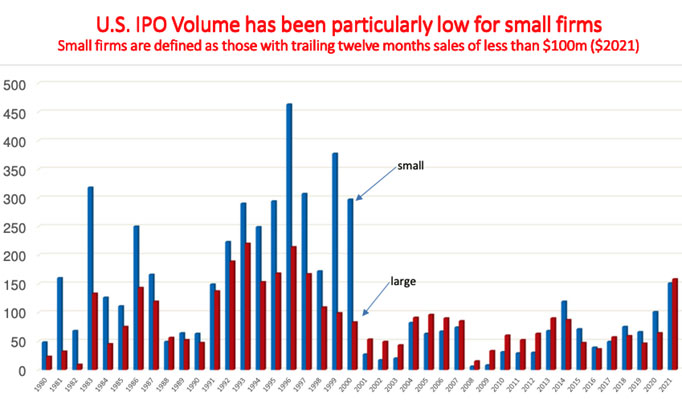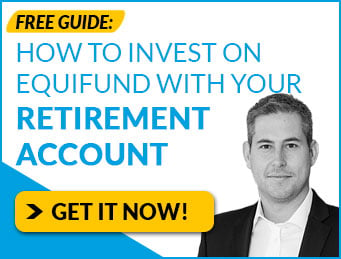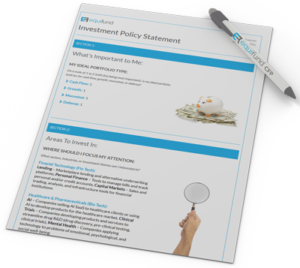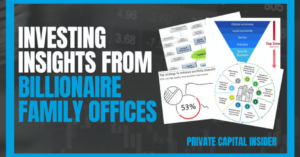As Pre-IPO investors, I think we can all agree that we’d like to see one of our companies make to the public stock market.
But before you ask the ever-so-common question, “when are you going public?”…
There’s a far more important question to ask if you’re looking to invest in companies who are looking to go public: “Why do you want to be a publicly traded company?”
In just a moment, we’ll share the answers we like to hear at Equifund…
But before we get into that, let’s take a step back and talk about the major changes in the stock market over the past few decades.
The Death Of Small Cap IPOs
Once upon a time, retail investors had a chance to invest in high-profile tech companies like Ebay, Amazon, Salesforce, and Google when they were still startups.
Why? Because in the 80’s and 90’s, the venture capital industry was still a fringe corner of finance.
This meant that – while there was some private capital available – the only way to raise a substantial amount of money was to be a public company.
All four of the companies mentioned raised less than $100 million in total VC funding prior to IPO, which happened 6-7 years after founding…
And their largest Pre-IPO valuations were all sub $400 million.
As a result, a majority of the value creation happened after the company went public…
Everyday investors had an opportunity to invest in exciting, early stage companies…
And the huge, liquid pools of capital in the US Stock Market provided tremendous fuel for economic growth, job creation, innovation, and personal wealth-building.
Between 1980-2000, an average of 310 operating companies went public every year. By 1997, there were 7,414 public companies listed on national exchanges.
But then, the dot-com crash changed everything…
Source: The Securities and Exchange Commission Office of the Advocate for Small Business Capital Formation, Annual Report for Fiscal Year 2021
After the unhinged mania that was tech investing in the 90’s… not only did investors’ appetite for risky growth stocks decline…
But thanks to a series of rather high profile frauds – like Enron, WorldCom and Bernie Madoff – the government decided to do what they did best when there’s a crisis of confidence:
Start passing laws, issuing fines, and (maybe) sending people to jail.
At the time, the prevailing narrative was “going public costs too much money,” so it would be better to stay private as long as possible.
And thanks to the trillions of dollars that have flowed out of the public markets and into the private markets…
Companies are staying private for an average 10-12 years…
Valuations are in the billions before they ever reach the public markets…
And the number of “small IPOs” – like we saw in the 1980-2000’s era – have declined drastically.
Img Source: Jay Ritter, IPOs in the US since 1980
Great news if you’re one of the 0.01% who has access to these exclusive investment opportunities.
But for the average retail investor, it means being locked out of the best wealth building opportunities on the market.
Thanks to the JOBS Act, everyday investors now have the chance to invest in exciting companies before they go public…
But most retail investors we’ve talked to have no interest in being locked up for 5-10+ years.
Which brings us to a bit of a prisoner’s dilemma when investing.
If companies can access tremendous amounts of capital in the private markets… small IPOs are nearly non-existent… and retail investors want to be liquid in 1-3 years…
There has to be a good reason for going public way earlier than what we’re seeing.
Why Private Companies Should Consider Going Public As Soon As Possible
Between March 2009 and February 2020, the United States saw the longest bull market in stock market history.
And for more than a decade, this historic run up has been fueled by the massive expansion of the Federal Reserve balance sheet (called quantitative easing) and near-zero interest rates.
This, in turn, perpetuated a massive “ponzi-like” asset inflation in the private (and public) markets.
Here’s how it works…
In a low interest rate environment, capital is desperate for yield. Lured in by the promises of venture capital, more money flows out of the public markets and into the private markets.
However, there is only a finite number of “good deals” at any given time…
And thanks to the law of supply and demand, as more capital chases the same finite number of deals, companies can raise larger rounds at higher valuations.
On paper, this continual step up in valuation makes it appear that investors are seeing market crushing returns…
More money floods in, valuations keep going up, and the cycle continues.
But eventually, these private companies get so big – and often times become so over valued – there’s only one exit left…
You – the retail investor – have always been the final exit strategy for Wall Street.
Thanks to the Post-COVID stock market boom, we saw record numbers of bloated VC-backed companies hit the market…
And as you may already know, it’s been an absolute bloodbath for these late-stage, VC backed companies.
As a result, we’re starting to hear major Wall Street firms preach the value of going public sooner than later.
In 2019 interview on CNBC, BlackRock CEO Larry Fink said going public was a key component for building a strong organization because the process gives investors transparency into the business.
“If you don’t set a culture of building long term profitability, having a culture of only growth at all costs really produces bad outcomes in the long run.
I think you should be going public sooner to respond to that transparency.”
In a March 2022 interview with Brad Gerstner, founder and CEO of Altimier Capital said:
“I hope that we start to see a return of earlier IPOs.
I think it’s great for retail investors. I think it’s great for companies. They need the discipline.
Having companies running around with billions of dollars on their balance sheet, decacorn valuations ($10B+), and not the discipline of public markets, to me is not a great thing for the company, for the employees, and for the founders.
I think that the public markets are not only an important source of capital, but it provides a source of discipline.”
And now that the attitude in public markets has decidedly changed – and investors care a LOT more about profitability vs cash-incinerating growth at all costs – we believe this desire for discipline will change founders feelings about being public.
Yes, there is certainly a cost to going public and staying public… but the credibility that comes with being a public company may provide tremendous benefits.
- Access to Capital: Even though there’s no shortage of money in private markets, public companies often have access to more – and cheaper – capital. Why? Because…
- Liquidity: When a company stock is public, it means shareholders can sell whenever they want. Not only can early investors (or employees) sell stock more easily, it lowers the risk of future investments if the stock is liquid. But it also helps with…
- Acquisitions: Want to buy some other companies? Having a liquid stock makes it that much easier to pay for it using company stock.
- Recruitment: Want to attract great people to your company? Being a public company not only comes with greater prestige, but it gives the company the resources it needs to build attractive compensation packages that wouldn’t be possible as a private company.
- Business Development: Not only does an IPO create publicity and brand awareness for the company, it can be a sign of quality for buyers making a decision.
As a legal disclaimer, there is no guarantee that a company will receive any of these benefits by going public.
However, all things being equal, we prefer to work with management teams who are actively pursuing a path to public markets…
And perhaps more important, know what needs to be true in order for them to go public in the first place.
According to Julia Hartz, Cofounder and current CEO of Eventbrite…
“We knew that along the way, we would want to become a public company. So that was always part of the plan.
And I think I really learned that from Kevin [Hartz], that the best companies are often public companies, and that’s because those companies have found what makes their business tick, how to meet the needs of their customers, and they couple that with the rigor and visibility of being in the public market.
IPO-ing was always on our list of things we would do at Eventbrite when we dot, dot, dot. And the dot, dot, dot for us was reaching a certain revenue threshold and having visibility and confidence that we could continue to drive the business.”
The takeaway?
Don’t ask “when are you going public?”…
Ask “why do you want to go public?” and “what KPIs do you want to see before you’d feel ready to be a public company?”
Final Thoughts
As investors, we have to remember that the goal isn’t “growth at all costs.” It’s to build an enduring business that creates jobs, solves problems, and lasts for decades (even generations).
Sure, you may prefer to be liquid in 1-3 years… but if you’re looking to invest in the next “big thing,” just remember that it takes much longer:
- Apple: Apple IPO’d on Dec 12, 1980 at a $1.8bn market cap. Today – more than 40 years later – it’s ~$2.45 trillion.
- Microsoft: IPO’d on Mar 13, 1986 at a $700m market cap. Today, it’s worth $2.06 trillion
- Amazon: IPO’d on May 15, 1997 at a ~$438m market cap. Today, it’s worth $1.17T.
For these reasons, we believe an IPO shouldn’t be thought of as the “exit” for early stage investors.
Instead, we hope it’s simply “the end of the beginning.”
But before they start their next journey, we want them to be prepared for the trials and tribulations they’ll face in the public markets.
Sincerely,
Jake Hoffberg – Publisher
Equifund




